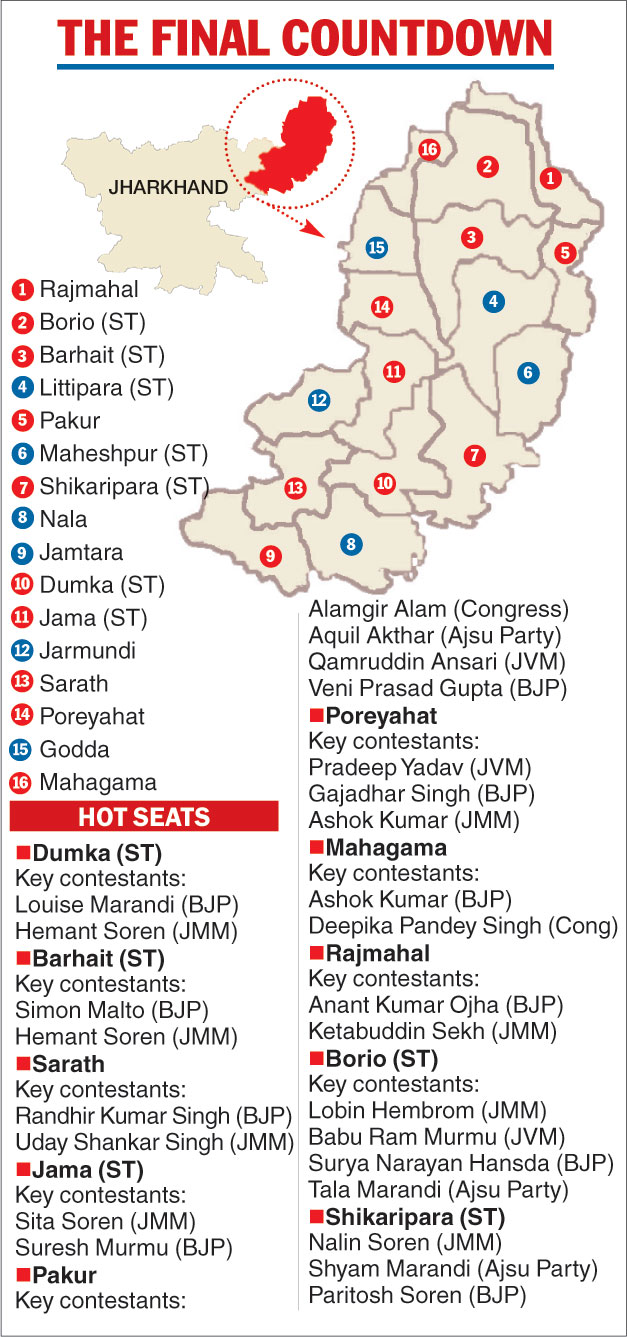Just how key the fifth and final phase of the Jharkhand elections is was evident from the raft of national leaders who made a beeline to campaign in the 16 Assembly seats that vote on Friday.
Prime Minister Narendra Modi addressed back-to-back rallies in Dumka and Barhait, and Congress leader Rahul Gandhi and his sister and party national general-secretary Priyanka Gandhi Vadra addressed rallies in Mahagama and Pakur respectively. BJP national president Amit Shah also rallied in Pakur.
The seats that will vote on Friday are all part of the six districts that make up the Santhal Pargana region, and 39,34,870 voters will determine the fate of 236 candidates. Santhal Pargana has two more seats, Madhupur and Deoghar, which voted in the fourth phase.
Of the total 18 seats of Santhal Pargana, the BJP had won seven seats — Rajmahal, Borio, Dumka, Madhupur, Deoghar, Godda and Mahagama — in the 2104 Assembly elections. The JMM had won six (Nala, Barhait, Littipara, Maheshpur, Shikaripara and Jama), the Congress had bagged three (Pakur, Jamtara and Jarmundi). The JVM had won two seats, Sarath and Poreyahat.
The Narendra Modi factor and the division in the anti-BJP votes — there was no Opposition alliance — were cited as reasons for the BJP making inroads in Santhal Pargana.
The 2014 poll results had come as a setback for the JMM as then chief minister Hemant Soren lost Dumka to the BJP’s Louise Marandi. However, the JMM working president won from Barhait with a comfortable margin.
Hemant, the CM face of the JMM-Congress-RJD alliance this time, is contesting both seats this time also.
The BJP is banking on its “national issues” plank. It was in Santhal Pargana that Prime Minister Modi declared that those indulging in violence (in the protests against the amended citizenship law and the National Register of Citizens) can be identified by their clothes.

The BJP’s now-former ally, Ajsu Party, seemed to toe the saffron party’s line with a caveat.
“The NRC is for all the people and there is nothing against Muslims in the Citizenship Amendment Act; if anybody harms Muslims, we will fight,” said Ajsu Party spokesperson Deosharan Bhagat.
Muslims can swing the elections in at least five of the 16 seats: Rajmahal, Pakur, Jamtara, Godda and Sarath.
The Opposition alliance has also raked up how the Raghubar Das government tried to amend the age-old laws that protect tribal land.
However, the JVM and the Ajsu Party — which claims it is done with the BJP — are worrying factors for the JMM. At every rally, Hemant cautioned voters that both the JVM and the Ajsu were in the B team of the BJP and were trying to eat into the anti-ruling party votes.
Against Hemant, the BJP has fielded state welfare minister Louise Marandi from Dumka and Simon Malto from Barhait.
The defeat of JMM patriarch and Hemant’s father Shibu Soren from Dumka in the Lok Sabha elections this year signalled that the Dumka Assembly constituency, considered a JMM bastion, is no longer a “safe” seat.
Santhal Pargana has been fortress for the first family of the JMM; Sita Murmu, daughter-in-law of Shibu Soren, made her first successful electoral debut from Jama and retained the seat in the last Assembly elections. This time, the BJP has fielded against her Suresh Murmu, who had lost in 2014 by just 2,306 votes.
The fifth and final phase will also decide the future of state agriculture minister Randhir Kumar Singh. He had won the 2014 Assembly election from Sarath as the JVM nominee by defeating the BJP’s Uday Shankar Singh. But Randhir later joined the BJP with five other JVM MLAs. The JVM has fielded Uday Shankar Singh from Sarath.
In Poreyahat, sitting JVM MLA Pradeep Yadav, who spearheaded the movement against land acquisition for the Adani power project, is contesting against the BJP’s Gajadhar Singh.
In Mahagama, the Congress has fielded its firebrand leader Deepika Pandey Singh against sitting BJP MLA Ashok Kumar.

